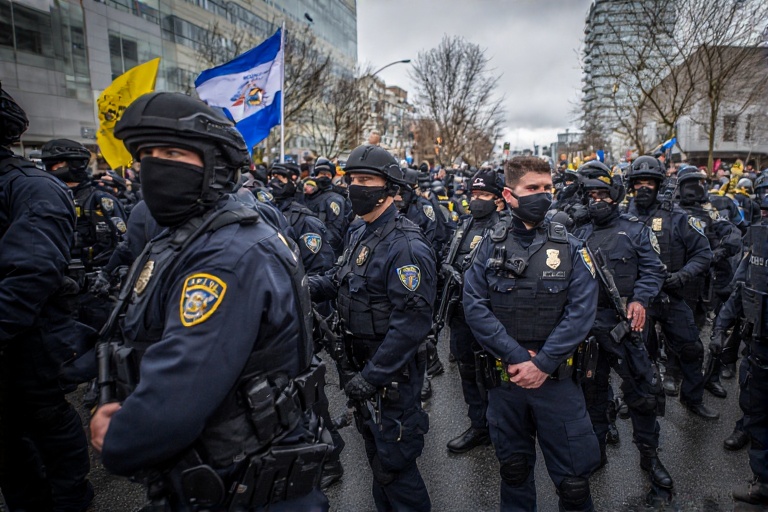
In a gripping legal battle that has sparked nationwide debate, four Seattle police officers are fighting to keep their identities hidden after attending former President Donald Trump’s “Stop the Steal” rally on January 6, 2021, in Washington, D.C. These Seattle officers involved in Jan. 6 rally seek anonymity to shield themselves from potential public backlash and harassment, arguing that revealing their names could violate their privacy and chill their free speech rights. The case, which has climbed from Washington state courts to the U.S. Supreme Court, raises critical questions about the balance between government transparency and individual rights. As the public demands accountability from law enforcement, the officers’ plea for secrecy has ignited discussions about free expression, public records, and the consequences of political actions. This article dives into the details of this complex case, exploring its background, legal arguments, and broader implications.
Background of the Jan. 6 Rally and Investigation
On January 6, 2021, thousands gathered in Washington, D.C., for the “Stop the Steal” rally, organized to protest the certification of the 2020 presidential election results. The event turned chaotic when a mob stormed the U.S. Capitol, leading to five deaths and numerous injuries. Among the attendees were six Seattle Police Department (SPD) officers, prompting then-Chief Adrian Diaz to order an investigation by the Office of Police Accountability (OPA). The probe found that two officers, Caitlin and Alexander Everett, violated laws by crossing Capitol barriers, leading to their termination. The other four Seattle officers involved in Jan. 6 rally seek anonymity after being cleared of wrongdoing. A public records request by Sam Sueoka, a former law student, sparked a legal fight when these officers sued to block the release of their identities, citing privacy concerns.
The Legal Battle for Anonymity
The four Seattle officers involved in Jan. 6 rally seek anonymity under pseudonyms like “John Doe” in their lawsuit against the SPD and OPA. They argue that disclosing their names would expose them to harassment and harm their reputations, especially in a city like Seattle, where political views associated with the rally are unpopular. Their attorney, Joel Ard, claims the investigation’s questions about their political beliefs and motivations for attending the rally infringe on their First Amendment rights. The Washington State Supreme Court, however, ruled in February 2025 that the officers’ attendance at a public event does not grant them privacy protections under state law. The court emphasized transparency, stating the officers failed to prove a privacy violation. Undeterred, the Seattle officers involved in Jan. 6 rally seek anonymity by petitioning the U.S. Supreme Court for a stay.
Washington State Supreme Court’s Ruling
In a unanimous decision on February 13, 2025, the Washington State Supreme Court rejected the officers’ plea for anonymity. Justice Raquel Montoya-Lewis wrote that the Seattle officers involved in Jan. 6 rally seek anonymity but failed to show that releasing their names violates their privacy rights. The court noted that attending a widely publicized event like the Jan. 6 rally does not inherently qualify as private activity. The ruling overturned a prior Washington Court of Appeals decision that had sided with the officers, citing First Amendment protections for anonymous political expression. The state’s high court argued that public records laws prioritize transparency, and the officers’ participation in the rally, even if legal, does not exempt them from public scrutiny. This decision prompted the officers to escalate their case to the U.S. Supreme Court, seeking to protect their identities.
U.S. Supreme Court’s Response
In April 2025, the Seattle officers involved in Jan. 6 rally seek anonymity by filing a petition with the U.S. Supreme Court, requesting a stay on the Washington court’s ruling. Their attorney argued that disclosing their identities and responses to investigative questions about their political beliefs could cause “irreparable harm” and suppress their free speech. The petition highlighted a “chilling effect” on public employees expressing unpopular opinions. However, on June 4, 2025, the U.S. Supreme Court denied the officers’ request for a stay in a unanimous decision. Justice Samuel Alito, joined by Justice Clarence Thomas, issued a concurring statement acknowledging the First Amendment concerns but noted that the officers’ delay in seeking emergency relief weakened their case. The ruling means the Seattle officers involved in Jan. 6 rally seek anonymity but must now face public disclosure.
First Amendment and Privacy Concerns
At the heart of this case is the tension between First Amendment rights and public transparency. The Seattle officers involved in Jan. 6 rally seek anonymity, claiming that revealing their identities would violate their rights to free speech and political association. They argue that the SPD’s investigation went beyond their actions, probing their personal beliefs and motivations, which they view as protected under the Constitution. Their petition to the U.S. Supreme Court emphasized that forcing public employees to disclose off-duty political activities could discourage free expression, especially for those with controversial views. On the other hand, advocates like Sam Sueoka argue that public officials, particularly police officers, must be accountable, and their attendance at a politically charged event warrants scrutiny. This debate underscores broader questions about how far privacy protections extend for public servants.
Public Records and Transparency
Washington’s Public Records Act aims to ensure government transparency, allowing citizens like Sam Sueoka to request documents such as the OPA’s investigation records. The Seattle officers involved in Jan. 6 rally seek anonymity to block the release of these records, arguing that unredacted documents could lead to public vilification. However, the Washington State Supreme Court ruled that the officers’ attendance at a public rally does not qualify for privacy exemptions under the law. Critics of the officers’ stance, including Sueoka’s legal team, argue that transparency is essential, especially for law enforcement officers whose actions reflect on public trust. The case has sparked discussions about whether agencies should consider constitutional rights before releasing records, a standard that could burden government operations if adopted. The Seattle officers involved in Jan. 6 rally seek anonymity, but transparency advocates see this as a test of open government principles.
The Role of Sam Sueoka
Sam Sueoka, a former law student turned attorney, played a pivotal role in this case by filing a public records request for the OPA’s investigation into the Seattle officers involved in Jan. 6 rally seek anonymity. Her request sought to uncover details about the officers’ actions and the SPD’s response, reflecting her belief in government accountability. Sueoka’s persistence led to the officers’ lawsuit, as they sought to block the release of their identities. Her legal team, led by attorney Neil Fox, argued that the officers’ presence at a public event negates their privacy claims and that public interest in law enforcement conduct outweighs individual concerns. Sueoka’s efforts have been praised by transparency advocates, who see her actions as a stand against efforts to shield public officials from scrutiny. Her case highlights the power of public records requests in holding government accountable.
Broader Implications for Law Enforcement
The case of the Seattle officers involved in Jan. 6 rally seek anonymity has far-reaching implications for law enforcement across the country. It raises questions about how officers’ off-duty political activities are scrutinized and whether such actions should impact their professional lives. The officers’ fear of harassment reflects a polarized climate where political beliefs can lead to public backlash. If public records laws consistently override privacy claims, officers may hesitate to engage in political expression, potentially stifling free speech. Conversely, allowing anonymity could set a precedent that weakens transparency, making it harder for communities to monitor law enforcement conduct. This case also highlights the challenges of balancing public trust in police with individual rights, especially in the wake of high-profile events like January 6. The outcome could influence how departments nationwide handle similar situations.
Public and Media Reaction
The case has drawn significant attention, with media outlets and the public divided on the issue. Some, like Ursula Reutin of “The Gee and Ursula Show,” express sympathy for the Seattle officers involved in Jan. 6 rally seek anonymity, questioning what publicizing their names achieves beyond shaming them. Others, including transparency advocates, argue that law enforcement officers should face scrutiny for attending a rally tied to a violent insurrection. Social media posts on X in 2021 revealed early public outrage, with users like @GNCordova and @eyesonthestorm criticizing the officers’ attempts to hide their identities. The debate reflects broader societal tensions about accountability, free speech, and the role of police in politically charged events. As the case unfolded, it became a lightning rod for discussions about trust in law enforcement and the right to privacy.
What’s Next for the Officers?
With the U.S. Supreme Court’s denial of their stay, the Seattle officers involved in Jan. 6 rally seek anonymity face the imminent release of their identities. They may continue their legal fight, potentially seeking a full review by the Supreme Court, though such cases are rarely accepted. The officers could also face professional repercussions, such as public criticism or internal SPD reviews, despite being cleared of wrongdoing. The case’s outcome could affect their careers and personal lives, given Seattle’s progressive political climate. Meanwhile, the public awaits the release of unredacted records, which could shed light on the officers’ motivations and the SPD’s handling of the investigation. The Seattle officers involved in Jan. 6 rally seek anonymity, but their fight may set a precedent for how public employees navigate the intersection of personal beliefs and professional accountability.
FAQs
1. Why do the Seattle officers involved in Jan. 6 rally seek anonymity?
The officers argue that revealing their identities could lead to harassment, reputational damage, and a violation of their First Amendment rights to privacy and free speech. They claim the SPD’s investigation into their political beliefs was intrusive and that public disclosure could chill their willingness to express unpopular opinions.
2. What did the Washington State Supreme Court decide?
In February 2025, the Washington State Supreme Court ruled that the officers’ names must be disclosed under the state’s public records law. The court found that attending a public event like the Jan. 6 rally does not grant privacy protections, prioritizing government transparency over the officers’ anonymity claims.
3. Why did the U.S. Supreme Court deny the officers’ request?
The U.S. Supreme Court rejected the officers’ request for a stay in June 2025, citing their delay in seeking emergency relief. While Justices Alito and Thomas acknowledged First Amendment concerns, they concluded the officers did not meet the threshold for immediate intervention.
4. Who is Sam Sueoka, and what was her role in this case?
Sam Sueoka, a former law student and now attorney, filed a public records request to obtain the OPA’s investigation records about the officers’ attendance at the Jan. 6 rally. Her actions prompted the officers’ lawsuit to block the release of their identities, sparking the legal battle.
5. How does this case impact law enforcement transparency?
The case highlights the tension between public records laws and individual privacy rights. A ruling favoring transparency could encourage greater scrutiny of law enforcement’s off-duty actions, while prioritizing anonymity might limit public access to information about police conduct, affecting trust in law enforcement.
Conclusion
The case of the Seattle officers involved in Jan. 6 rally seek anonymity underscores a critical clash between transparency and personal privacy. While the officers argue for their right to free speech and protection from public backlash, advocates like Sam Sueoka emphasize the need for accountability, especially for law enforcement. The Washington State Supreme Court’s ruling and the U.S. Supreme Court’s denial of a stay have tilted the balance toward transparency, but the broader debate continues. This case serves as a reminder of the complex interplay between constitutional rights and public trust in government institutions. As the officers face the potential release of their identities, their story will likely influence future discussions about how public servants navigate political expression in a divided society. The saga of the Seattle officers involved in Jan. 6 rally seek anonymity remains a pivotal moment in this ongoing conversation.


